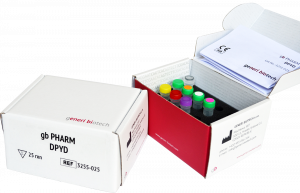Fluoropyrimidines (5-fluorouracil and its prodrugs capecitabine and tegafur) are the basic drugs used in chemotherapy of gastrointestinal cancer. Their use is limited by development of many toxic effects including life-threatening myelosuppression. Dihydropyrimidine dehydrogenase (DPD) catalyzes the initial step of pyrimidines catabolism.
It inactivates fluoropyrimidine chemotherapeutics and its activity influences the frequency of toxicity. It is not recommended to administer the fluoropyrimidines to the patients with DPD deficiency. When studying polymorfisms of the gene for DPD (DPYD), the relationship between presence of particular mutations and decreased activity of DPD has been demonstrated.
According to recommendations of pharmacogenetics consortia CPIC (from 2017) and DPWG (from 2019), the testing of presence of four polymorphisms in DPYD gene: *2A (c1905+1G>A), *13 (c1679T>G), HapB3 (c1236G>A) and c2846A>T is recommended before administration of the above substances. Insufficient evidence has been gathered for other polymorphisms in relation of their effect on DPD enzyme activity.
Parameters of the real-time PCR diagnostic kit
- ready-to-use assay
- input sample concentration 1-100 ng/µl
- positive controls for each of the genotypes and a negative control included
- FAM and HEX channels detection
- identical amplification profile as gb HEMO, gb GENETIC, gb PHARM kits

 Dual-labeled hydrolysis probes
Dual-labeled hydrolysis probes 

